Imagine a future where YOU own your data and not Big Tech. Imagine a future where you control what personal information you share, with whom and for how long.
Decentralized identity offers this future and the technology and standards are being developed today.
When available, decentralized identity will put an end to the practice of giant corporations storing your sensitive personal data–only for a hacker to come along and breach that database, exposing you to identity theft and financial fraud.
In this episode of Privacy Files, Rich and Sarah welcome Dr. Paul Ashley to the studio to break down the topic of decentralized identity–how it works, the technology underpinning it and the virtually infinite number of applications waiting to put this technology into practice.
Dr. Ashley is the Chief Technology Officer (CTO) at Anonyome Labs and one of the key industry players on the global stage who is developing the standards for decentralized identity.
The global decentralized identity market is expected to grow at a compound annual growth rate (CAGR) of 90.3% from 2023 to 2030. Most experts attribute the predicted rise in decentralized identity to the explosion in identity fraud cases.
In February 2022, the Federal Trade Commission (FTC) published a report revealing that identity fraud incidents increased by about 45% globally in 2020.
Sarah kicks off the episode by defining decentralized identity and explaining how this approach to managing personal data is part of the larger discipline of Identity and Access Management (IAM).
Dr. Ashley provides a history lesson on the evolution of IAM and the path that led us to decentralized identity today. He explains how data was first managed via a centralized approach. Then federated systems began to materialize. One common example of a federated approach to data management is Facebook. Facebook often asks users of the platform if they want to use their existing login credentials to access other platforms in order to collect that rich behavioral data. While convenient, the federate approach is a privacy nightmare.
Sarah and Dr. Ashley then look at the anatomy of the decentralized identity process. From digital wallets and verifiable credentials to issuers and verifiers, it’s a highly secure approach to giving the individual back control of their data–all based on blockchain technology.
Rich and Dr. Ashley follow with a discussion on potential use cases and detailed examples of how the process actually works.
Dr. Ashley closes out the episode by addressing some concerns about who controls decentralized identity and how the overall ecosystem should be structured to maximize privacy and security for digital wallet holders.
Links Referenced:
https://www.grandviewresearch.com/industry-analysis/decentralized-identity-market-report






